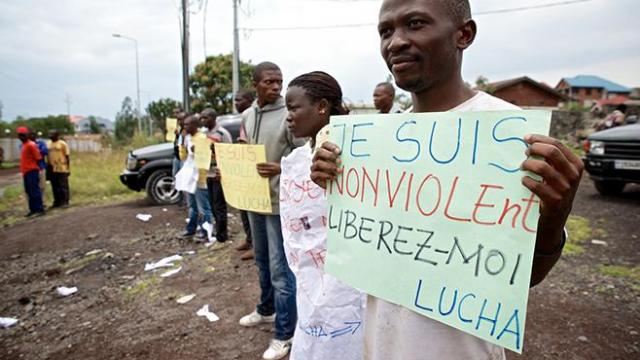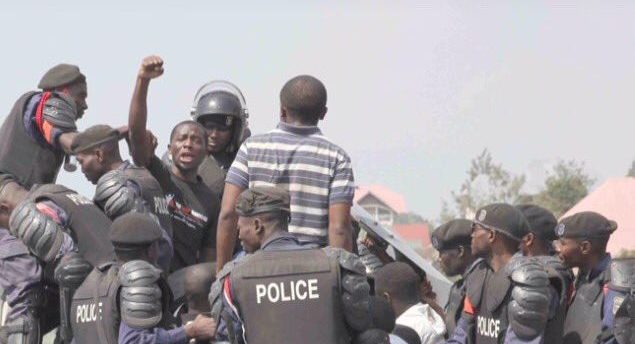
This is Part 17 in a series about Radical Municipalism looking at ways people worldwide are organizing in their cities to build power from the bottom up. Read Part 1 (Brazil), Part 2 (Rojava), Part 3 (Chiapas), Part 4 (Warsaw), Part 5 (Bologna), Part 6 (Jackson, Miss.), Part 7(Athens), Part 8 (Warsaw & New York), Part 9 (Reykjavík), Part 10 (Rosario, Argentina), Part 11 (Newham, UK), Part 12 (Valparaiso, Chile), Part 13 (Porto Alegre, Brazil), Part 14 (Montevideo, Uruguay), Part 15 (Venezuela), and Part 16 (Cape Town).
Peaceful protesters in the Democratic Republic of Congo (DRC) are facing violent, state-orchestrated repression ahead of elections scheduled for Dec. 23.
Headlines about a place beyond hope support the generalizations of war-torn DRC. Racist assertions that depict the African continent needing charity and Western intervention are myths. But these stereotypes can be shattered, in this case, by exploring who the protesters are and the causes of perpetual violence against them.
One group facing repression in DRC is Lucha, a horizontal citizens movement. Within the global radical municipalist sphere, little attention is paid to the African continent as a whole. Our series attempts to rebalance this with features on Cape Town's housing movement and upcoming stories about Senegal's Y'en a Marre and Tunisia's Jemna.
Goma and Beyond
The city of Goma in eastern DRC had suffered constant flooding due to inadequate drainage. In 2012, residents came together to form Lucha. It now has branches in every major DRC city, including the capital Kinshasa. Lucha works to improve water security and combat poverty at the municipal level, challenging endemic corruption and violence nationally.
Lucha is short for 'Lutte pour le Changement' (“Struggle for Change”). Fred Bahuma, one of the group's co-founders, explained why young people have joined this fight for basic dignity and health. Speaking to the Pambazuka news platform, Bahuma said:
“In DRC there’s more than 70% unemployment and about 90% youth unemployment. We live without electricity, while we could have one of the biggest hydroelectric dams in the world; we do not have access to drinking water, while we are called the water paradise because we have permanent sources of drinking water between rivers and regions with regular rain throughout the year; we live in insecurity, while we could be one of the political giants of Africa. There are deaths at each moment, and we’ve got tired of counting the people that have died around us. So a group of young people got together to say that we had to do something different.”
In 2014, Lucha mobilized thousands to march for the right to water in Goma. As well as marches, the movement has organized sit-insagainst local governors and others to press for change, and launched petitions as well as penned open letters. Its “Goma Wants Water” message flooded the streets on banners, t-shirts and cars. In April 2018, Lucha organized a march in the capital on the theme: “Kinshasa is filthy”.
At the heart of the movement is a do-it-yourself spirit. In Goma in particular, every week activists participate in work across the city to rebuild roads and other civic projects, leading by example. Another Lucha co-founder, Micheline Mwendike, explained what makes it a citizen's movement:
“We want to create spaces of expression and action with the objective of changing our country. We reject the path of violence, as well as the path of power... We want to be the alternative for Congo, a group of engaged people that accept the challenge of telling the truth and speak for ourselves.”
Lucha works horizontally, without a leader, with practical issues managed collectively. Decisions are made through a general assembly and everyone can bring proposals to meetings.
Peacefully Challenging Violence
Lucha's actions are similar to those of other democratic movements happening within the radical municipalist frame across the world. But its reality is something distinct: it exists in the face of extreme violence in DRC. Another movement co-founder, Luc Nkulula, died in his house in a fire on April 10, 2018. Allegations point toward a state sanctioned murder. Nkulula was at the forefront of the campaign to force President Joseph Kabila to hold elections, which are scheduled for later this month.
Human Rights Watch reported that between 2015 and 2018, nearly 300 protesters, most of them peaceful, were killed by DRC state forces. But it would be too one-dimensional to blame only Kabila's government. The ongoing violence in DRC is the product of years of international efforts to colonize and loot the country; the Congo remains extremely rich in resources while its people are desperately poor. For example, Goma, where Lucha is mobilizing for the right to water, stands just next to Lake Kiva, the eighth largest lake in Africa.
From Slavery to Colonialism to War
When people join Lucha, part of their introduction to the movement involves learning about the history of the DRC. Even a brief overview shows one overarching theme: A circle of violence has enriched a select few people working in tandem with international powers to impoverish and oppress the majority.
In President Kabila's DRC, children are forced to work and die in mines, while fighting over the minerals. The profits of this grotesque market go to western and Chinese corporations, which further enable global over-consumption.
Before president Kabila came to power in 2001, the Congo suffered two wars – one in 1996-'97, the other in 1998-2003 – which were considered the deadliest anywhere since WWII. In the end, these bloodbaths came down to locals fighting over scraps while the riches went to mining companies, big banks and arms dealers overseas.
Between 1965 and 1997, the Congolese people endured a brutal dictator, Mobutu Sese Seko, who renamed the country Zaire. He was supported by the West and multinational corporations, and came to power in a coup with CIA and Belgian backing. Mobutu's men killed Patrice Lumumba, DRC's first elected president.
What happened before Congo gained independence in 1960 is similar. The Belgians grew very rich from their colony and the locals were brutalized. King Leopold II was responsible for the worst period, killing an estimated 10 million people, many of whom were worked to death for rubber. Before this era, the British Empire had enslaved Congolese.
The creation of Lucha in 2012 is all the more remarkable because it happened during another violent chapter in the DRC. Goma was the epicentre of the bloody M23 rebellion in 2012-'13, where fighting intensified due to soldiers who came off the genocide experience in Rwanda, another ex-Belgian colony.
Make no mistake: Lucha's peaceful struggle is taking place in one of the most dangerous places in the world. But, like radical municipalists everywhere, and here even more so, the movement shows there are hopes and alternatives. Many Congolese are determined to rebuild their country and break from long-term cycles of violence and poverty. To fulfill this goal, they also need the Global North to change its activities. This doesn't mean increasing aid, but rather stopping the looting of the country's mineral riches, and facilitating reparations for the centuries of colonialism and slavery.
Read: Part 1 (Brazil), Part 2 (Rojava), Part 3 (Chiapas), Part 4 (Warsaw), Part 5 (Bologna), Part 6 (Jackson, Miss.), Part 7(Athens), Part 8 (Warsaw & New York), Part 9 (Reykjavík), Part 10 (Rosario, Argentina), Part 11 (Newham, UK), Part 12 (Valparaiso, Chile), Part 13 (Porto Alegre, Brazil), Part 14 (Montevideo, Uruguay), Part 15 (Venezuela), and Part 16 (Cape Town)












